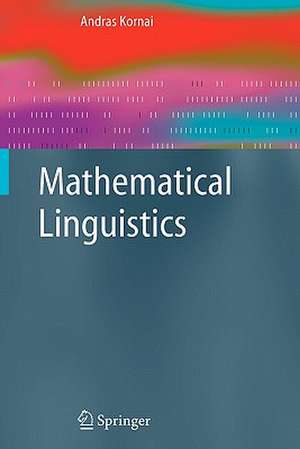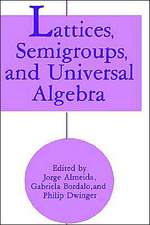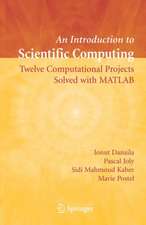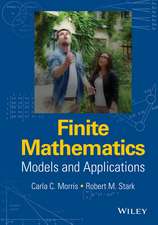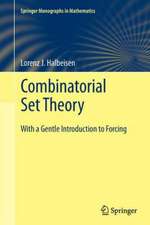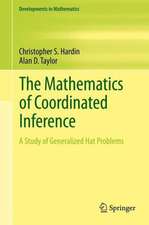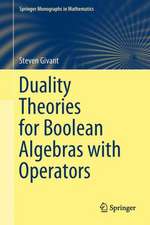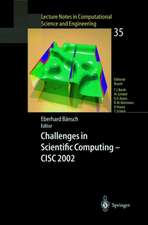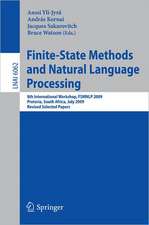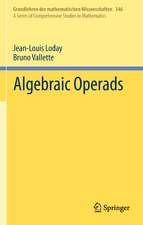Mathematical Linguistics: Advanced Information and Knowledge Processing
Autor Andras Kornaien Limba Engleză Paperback – 22 oct 2010
Previous textbooks in this area concentrate on syntax and semantics - this comprehensive volume covers an extremely rich array of topics also including phonology and morphology, probabilistic approaches, complexity, learnability, and the analysis of speech and handwriting.
As the first textbook of its kind, this book is useful for those in information science (information retrieval and extraction, search engines) and in natural language technologies (speech recognition, optical character recognition, HCI). Exercises suitable for the advanced reader are included, as well as suggestions for further reading and an extensive bibliography.
| Toate formatele și edițiile | Preț | Express |
|---|---|---|
| Paperback (1) | 454.92 lei 6-8 săpt. | |
| SPRINGER LONDON – 22 oct 2010 | 454.92 lei 6-8 săpt. | |
| Hardback (1) | 534.17 lei 6-8 săpt. | |
| SPRINGER LONDON – 10 noi 2007 | 534.17 lei 6-8 săpt. |
Din seria Advanced Information and Knowledge Processing
- 20%
 Preț: 330.44 lei
Preț: 330.44 lei - 20%
 Preț: 53.43 lei
Preț: 53.43 lei - 20%
 Preț: 1042.28 lei
Preț: 1042.28 lei - 18%
 Preț: 726.85 lei
Preț: 726.85 lei - 20%
 Preț: 646.30 lei
Preț: 646.30 lei - 20%
 Preț: 990.80 lei
Preț: 990.80 lei - 20%
 Preț: 647.61 lei
Preț: 647.61 lei - 20%
 Preț: 996.56 lei
Preț: 996.56 lei - 20%
 Preț: 994.40 lei
Preț: 994.40 lei - 20%
 Preț: 985.03 lei
Preț: 985.03 lei - 20%
 Preț: 654.37 lei
Preț: 654.37 lei - 20%
 Preț: 989.79 lei
Preț: 989.79 lei - 20%
 Preț: 991.27 lei
Preț: 991.27 lei - 15%
 Preț: 645.79 lei
Preț: 645.79 lei - 20%
 Preț: 817.55 lei
Preț: 817.55 lei - 20%
 Preț: 991.46 lei
Preț: 991.46 lei - 18%
 Preț: 1114.83 lei
Preț: 1114.83 lei - 20%
 Preț: 589.93 lei
Preț: 589.93 lei - 20%
 Preț: 995.75 lei
Preț: 995.75 lei - 20%
 Preț: 992.62 lei
Preț: 992.62 lei - 20%
 Preț: 645.14 lei
Preț: 645.14 lei - 20%
 Preț: 647.61 lei
Preț: 647.61 lei - 20%
 Preț: 638.69 lei
Preț: 638.69 lei - 18%
 Preț: 955.08 lei
Preț: 955.08 lei - 20%
 Preț: 643.97 lei
Preț: 643.97 lei - 20%
 Preț: 983.02 lei
Preț: 983.02 lei - 20%
 Preț: 645.31 lei
Preț: 645.31 lei - 18%
 Preț: 950.96 lei
Preț: 950.96 lei - 20%
 Preț: 921.17 lei
Preț: 921.17 lei - 20%
 Preț: 653.71 lei
Preț: 653.71 lei - 20%
 Preț: 988.00 lei
Preț: 988.00 lei - 18%
 Preț: 947.67 lei
Preț: 947.67 lei - 20%
 Preț: 1004.99 lei
Preț: 1004.99 lei - 20%
 Preț: 650.92 lei
Preț: 650.92 lei - 20%
 Preț: 998.21 lei
Preț: 998.21 lei - 20%
 Preț: 642.65 lei
Preț: 642.65 lei - 20%
 Preț: 988.00 lei
Preț: 988.00 lei - 20%
 Preț: 997.38 lei
Preț: 997.38 lei - 20%
 Preț: 650.59 lei
Preț: 650.59 lei - 20%
 Preț: 647.61 lei
Preț: 647.61 lei
Preț: 454.92 lei
Nou
Puncte Express: 682
Preț estimativ în valută:
87.05€ • 93.09$ • 72.58£
87.05€ • 93.09$ • 72.58£
Carte tipărită la comandă
Livrare economică 18 aprilie-02 mai
Preluare comenzi: 021 569.72.76
Specificații
ISBN-13: 9781849966948
ISBN-10: 184996694X
Pagini: 304
Ilustrații: XIV, 290 p.
Dimensiuni: 155 x 235 x 16 mm
Greutate: 0.43 kg
Ediția:Softcover reprint of hardcover 1st ed. 2008
Editura: SPRINGER LONDON
Colecția Springer
Seria Advanced Information and Knowledge Processing
Locul publicării:London, United Kingdom
ISBN-10: 184996694X
Pagini: 304
Ilustrații: XIV, 290 p.
Dimensiuni: 155 x 235 x 16 mm
Greutate: 0.43 kg
Ediția:Softcover reprint of hardcover 1st ed. 2008
Editura: SPRINGER LONDON
Colecția Springer
Seria Advanced Information and Knowledge Processing
Locul publicării:London, United Kingdom
Public țintă
ResearchCuprins
The elements.- Phonology.- Morphology.- Syntax.- Semantics.- Complexity.- Linguistic pattern recognition.- Speech and handwriting.- Simplicity.
Recenzii
From the reviews:
"Kornai’s contribution is refreshingly different in that he treats, in this relatively compact volume, practically all areas of linguistics, phonetics, and speech and language processing. … A single entry point to the central methods and concepts of linguistics that are made largely … to the mathematician, computer scientist, or engineer … . the most likely readership of this book consists of (computational) linguists and others who already know the linguistic issues … ." (Richard Sproat and Roxana Gîrju, Computational Lingustics, Vol. 34 (4), 2008)
"This is a remarkable book on the mathematics used for linguistics. … it provides a coherent, well-written view of the math required to model the structure of langiage as used in the main branches of linguistics: phonology, morphology, syntax, and semantics. The intended audience is anyone with sufficient general mathematical maturity, such as advanced undergraduate math. … The math is presented well, and the material has a strong narrative flow." (Rohan Baxter, Computing Reviews, March, 2009)
“The book deals … with mathematics inspired by linguistics than with applications of mathematics in linguistics. A large part of the book deals with mathematical models of signal, speech, and handwriting recognition. The book consists of ten chapters. Every chapter contains interesting examples, elegant mathematics and many further reading hints. … The book contains many interesting mathematical models, stimulating examples and elegant proofs, and it is well written.” (Jaroslav Král', Zentralblatt MATH, Vol. 1171, 2009)
"Kornai’s contribution is refreshingly different in that he treats, in this relatively compact volume, practically all areas of linguistics, phonetics, and speech and language processing. … A single entry point to the central methods and concepts of linguistics that are made largely … to the mathematician, computer scientist, or engineer … . the most likely readership of this book consists of (computational) linguists and others who already know the linguistic issues … ." (Richard Sproat and Roxana Gîrju, Computational Lingustics, Vol. 34 (4), 2008)
"This is a remarkable book on the mathematics used for linguistics. … it provides a coherent, well-written view of the math required to model the structure of langiage as used in the main branches of linguistics: phonology, morphology, syntax, and semantics. The intended audience is anyone with sufficient general mathematical maturity, such as advanced undergraduate math. … The math is presented well, and the material has a strong narrative flow." (Rohan Baxter, Computing Reviews, March, 2009)
“The book deals … with mathematics inspired by linguistics than with applications of mathematics in linguistics. A large part of the book deals with mathematical models of signal, speech, and handwriting recognition. The book consists of ten chapters. Every chapter contains interesting examples, elegant mathematics and many further reading hints. … The book contains many interesting mathematical models, stimulating examples and elegant proofs, and it is well written.” (Jaroslav Král', Zentralblatt MATH, Vol. 1171, 2009)
Textul de pe ultima copertă
Mathematical Linguistics introduces the mathematical foundations of linguistics to computer scientists, engineers, and mathematicians interested in natural language processing. The book presents linguistics as a cumulative body of knowledge from the ground up, with no prior knowledge of linguistics being assumed, covering more than the average two-semester introductory course in linguistics.
This comprehensive, reader-friendly volume offers readers a high-level orientation, discussing the foundations of the field and presenting both the classical work and the most recent results. It covers an extremely rich array of topics including not only syntax and semantics but also phonology and morphology, probabilistic approaches, complexity, learnability, and the analysis of speech and handwriting.
As the first text of its kind, this innovative book will be a valuable tool and reference for those in information science (information retrieval and extraction, search engines) and in natural language technologies (speech recognition, optical character recognition, HCI). Exercises suitable for advanced readers are included as well as suggestions for further reading and an extensive bibliography.
"I'm pleased and impressed. The book is very readable, often entertaining---it tells what the issues are, what they are called, in what health they are, where more meat can be found. Given the enormous amount of material and concepts touched on, and the technical difficulties lying under the surface almost everywhere, the book betrays scholarship in a matter-of-fact way, making due impression on, but without clobbering, the reader. This is a book that invites READING THROUGH…".
Professor Tommaso Toffoli, Boston University, USA
"It is a remarkable achievement, essential reading for every linguist who aspires to be well informed about applications of mathematics in the languagesciences."
Professor Geoffrey Pullum, University of Edinburgh, UK
"I really liked this book. First, it is written very well and secondly, the author has taken a rather non-standard but very attractive approach to mathematical linguistics. It is very refreshing."
Professor Aravind K. Joshi, University of Pennsylvania, USA
This comprehensive, reader-friendly volume offers readers a high-level orientation, discussing the foundations of the field and presenting both the classical work and the most recent results. It covers an extremely rich array of topics including not only syntax and semantics but also phonology and morphology, probabilistic approaches, complexity, learnability, and the analysis of speech and handwriting.
As the first text of its kind, this innovative book will be a valuable tool and reference for those in information science (information retrieval and extraction, search engines) and in natural language technologies (speech recognition, optical character recognition, HCI). Exercises suitable for advanced readers are included as well as suggestions for further reading and an extensive bibliography.
"I'm pleased and impressed. The book is very readable, often entertaining---it tells what the issues are, what they are called, in what health they are, where more meat can be found. Given the enormous amount of material and concepts touched on, and the technical difficulties lying under the surface almost everywhere, the book betrays scholarship in a matter-of-fact way, making due impression on, but without clobbering, the reader. This is a book that invites READING THROUGH…".
Professor Tommaso Toffoli, Boston University, USA
"It is a remarkable achievement, essential reading for every linguist who aspires to be well informed about applications of mathematics in the languagesciences."
Professor Geoffrey Pullum, University of Edinburgh, UK
"I really liked this book. First, it is written very well and secondly, the author has taken a rather non-standard but very attractive approach to mathematical linguistics. It is very refreshing."
Professor Aravind K. Joshi, University of Pennsylvania, USA
Caracteristici
Aims to teach linguistics to the reader but presumes only knowledge of mathematics at the undergraduate level The material was hitherto available only in the research literature Wide applicability in information science (information retrieval, information extraction, search engines) and in natural language technologies (speech recognition, OCR, HCI)
